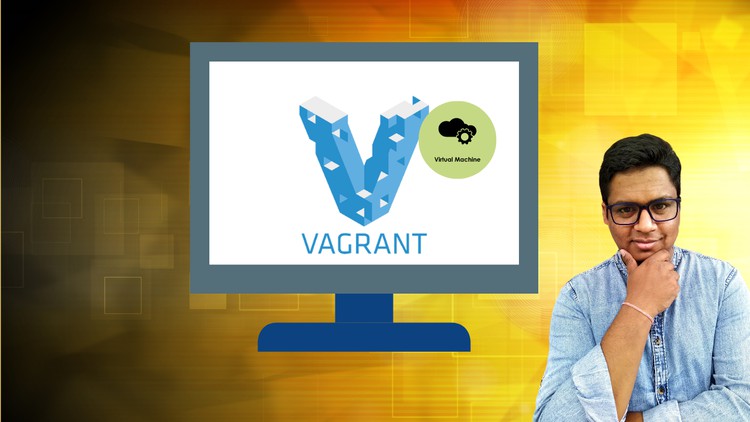
Use Vagrant to spin Virtual Machines, write Vagrantfiles and understand usage of Vagrant boxes and plugins
What you will learn
Understand the usage of Vagrant
Install Vagrant on Linux, Windows or MAC
Spin up single or multiple virtual machines with Vagrant with multiple hypervisors
Use Vagrant boxes and plugins
Push Vagrant boxes
Write Vagrantfiles
Share Vagrantfiles on Git
Description
Welcome to this hands-on course on Vagrant!!
Suited for :
- DevOps Engineers
- Computing Professionals
- Computer science students
- Technocrats
- A complete hands-on course on Vagrant
- Follow along – Set up your system and finish the exercises
After this course you would understand
Note➛ Make sure your 𝐔𝐝𝐞𝐦𝐲 cart has only this course you're going to enroll it now, Remove all other courses from the 𝐔𝐝𝐞𝐦𝐲 cart before Enrolling!
- Concepts related to Virtualization
- What is Vagrant
- What are various components of Vagrant
- Vagrant workflow
- Impact of Vagrant
- Concepts related to VM management
You would be able to
- Spin up a VM with VirtualBox
- Download and Install VirtualBox and Vagrant
- Write Vagrantfile for single and multiple VMs
- Manage VMs using Vagrant
What is Vagrant?
- Vagrant solves the problem of inconsistent development environments.
- When different team members are working on a project, they may be using different operating systems, software versions, and configurations. This can lead to compatibility issues and make it difficult to reproduce bugs and test new features.
- Vagrant addresses this issue by providing a way to create and manage virtual development environments that are identical for all team members. This eliminates compatibility issues and makes it easy to reproduce bugs and test new features.
- Vagrant also simplifies the process of setting up new development environments, which can be time-consuming and error-prone when done manually.
- By using Vagrant, developers can quickly spin up a new development environment with the necessary software and dependencies already configured, streamlining the development process.
English
language
Content
Introduction
Introduction to this course
Why learn Vagrant?
Learning objectives & How to get best out of this course.
Sections explained
Supporting Documentation
Virtualization 101
Resources
What is Virtualization?
Virtualization Terminology & Components
Hypervisor and it’s types
Benefits of Virtualization
HandsOn – Creating a VM in VirtualBox
Setting up your system
Installing VirtualBox on Windows
Installing Vagrant on Windows
Installing Vagrant on Linux
Installing VirtualBox on MAC
Understanding Vagrant
What is Vagrant
VM workflow with Vagrant
Vagrant components
Hands-on Excercises with Vagrant
Vagrant command cheat sheet
Understanding Vagrantfile
Setting up a VM with Vagrant
Vagrant virtual machine details and ssh
Vagrant boxes
Understanding VM.config parameters
VM Management with Vagrant
VM Snapshots
Provision the VM with inline script
Provisioning with a file
Provisioning with Ansible
Vagrant upload
Syncing files
Advance Topics
Multiple VM with Vagrant
Working with multiple VMs
Vagrant with Docker – Pulling an Image and Running the container
Vagrant with Docker – Building an Image
Conclusion
Bonus lecture